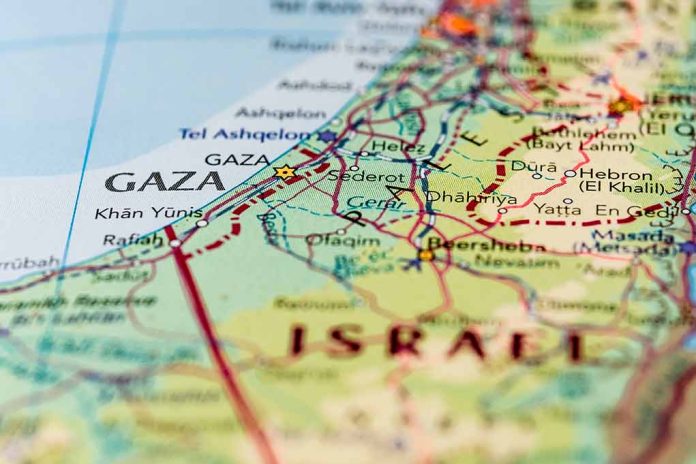
Donald Trump’s latest proposal to occupy the Gaza Strip invites not just legal conundrums but also potent human rights dilemmas.
Key Takeaways
- Trump’s Gaza Strip proposal was condemned globally as a violation of international law.
- Key regional powers and international stakeholders reject the idea, advocating for a two-state solution.
- Trump’s plan lacks legal authority and execution specifics, facing severe criticism.
- The proposal poses significant risks to international peace and raises concerns of ethnic cleansing.
- Diligent journalism is necessary to elucidate these complex issues to the public.
Trump’s Proposal Sparks Global High Alert
President Donald Trump’s suggestion to annex and redevelop the Gaza Strip into a “Riviera of the Middle East” reverberated across the global stage. His proposal resulted in widespread condemnation, particularly from Palestinian civilians and President Mahmoud Abbas of the Palestinian Authority, as it flagrantly contravenes international laws, most notably the Geneva Convention’s prohibition of forcible relocations.
The proposal could potentially breach these conventions, described by Abbas as a threat to rights that involved long-standing struggles and sacrifices. It spotlighted the challenge in balancing realpolitik with human rights.
International reactions came swiftly. Egypt, Jordan, and Saudi Arabia, along with global powers like France, the UK, Russia, and China, dismissed the plan, underscoring the necessity of a two-state solution for enduring peace. Furthermore, the International Court of Justice labels Gaza as an occupied territory, emphasizing the illegality of further occupation.
President Donald Trump's proposal to relocate 1.5 million Palestinians from Gaza to neighboring countries like Egypt and Jordan is not merely misguided—it is a calculated affront to international law and the principles of justice. Trump's remark, made last Saturday, about… pic.twitter.com/dPG6dJmf9U
— TheMuslimLawyer (@faisalkutty) February 3, 2025
Legal and Practical Hurdles Abound
The proposed U.S. takeover lacks substantive legal groundwork and details on implementation, encountering strong resistance not just from Palestinians but also from several Arab nations. Article 49 of the Geneva Conventions firmly opposes the forcible transfer or removal of individuals by an occupying force, and Trump’s proposal risks fueling tensions and destabilizing the region further.
“Make no mistake: This is a call for ethnic cleansing,” Mike Quigley wrote on social media.
An NPR poll indicated that 70% of Israelis would support relocating Gazans, though the plan is largely unpopular with Arab Israelis. Such divides illustrate the convoluted nature of Middle East politics, further complicating any push for territorial reassignment.
President Donald Trump's proposal for the United States to take "ownership" of the Gaza Strip and forcibly relocate its Palestinian population has sparked significant controversy and concern. The plan envisions displacing nearly 2 million Palestinians to neighboring countries… pic.twitter.com/E3cigeCxkD
— P a u l ◉ (@SkylineReport) February 5, 2025
The Threat of Dehumanizing Narratives
Trump’s rhetoric could even further dehumanize Palestinians, leading to more breaches of humanitarian laws. The ease with which taking over territories and relocating populations is discussed risks setting dangerous precedents.
For now, the world’s eyes remain on a plan that lacks legal backbone and practical feasibility. As governments and regional stakeholders navigate this tumultuous suggestion, responsible journalism plays an essential role in clarifying these complexities to the public.





